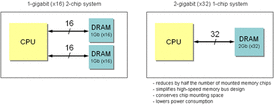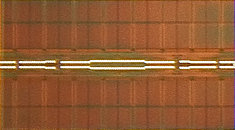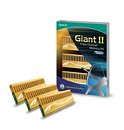
Elpida Starts Shipments of 4 Gbit Wide-IO LPDDR3 Memory Chips
Elpida Memory, Inc., the world's third largest Dynamic Random Access Memory manufacturer, today announced that it has begun sample shipments of 4-gigabit Wide IO Mobile RAM and 4-gigabit DDR3 Mobile RAM (LPDDR3).
Wide IO Mobile RAM is a next-generation mobile memory chip that provides solutions to opposing needs for faster speed and lower power consumption. The rising performance of smartphones and tablet devices in recent years has led to demand for faster DRAMs (DRAMs with greater data transfer rates), but in turn this has generated concerns about increases in system power consumption.
The solution is that Wide IO Mobile RAM expands the I/O width by using x512-bit, a data width that is more than 10 times larger than the width for existing DRAMs, which enables a data transfer rate of 12.8 gigabytes per second (GB/s) per chip while operating at a low speed of 200MHz. The reduced DRAM speed results in approximately 50% less power consumption compared with DDR2 Mobile RAM (LPDDR2), currently the leading DRAM choice for mobile devices, configured at the same transfer rate.
Wide IO Mobile RAM is a next-generation mobile memory chip that provides solutions to opposing needs for faster speed and lower power consumption. The rising performance of smartphones and tablet devices in recent years has led to demand for faster DRAMs (DRAMs with greater data transfer rates), but in turn this has generated concerns about increases in system power consumption.
The solution is that Wide IO Mobile RAM expands the I/O width by using x512-bit, a data width that is more than 10 times larger than the width for existing DRAMs, which enables a data transfer rate of 12.8 gigabytes per second (GB/s) per chip while operating at a low speed of 200MHz. The reduced DRAM speed results in approximately 50% less power consumption compared with DDR2 Mobile RAM (LPDDR2), currently the leading DRAM choice for mobile devices, configured at the same transfer rate.






